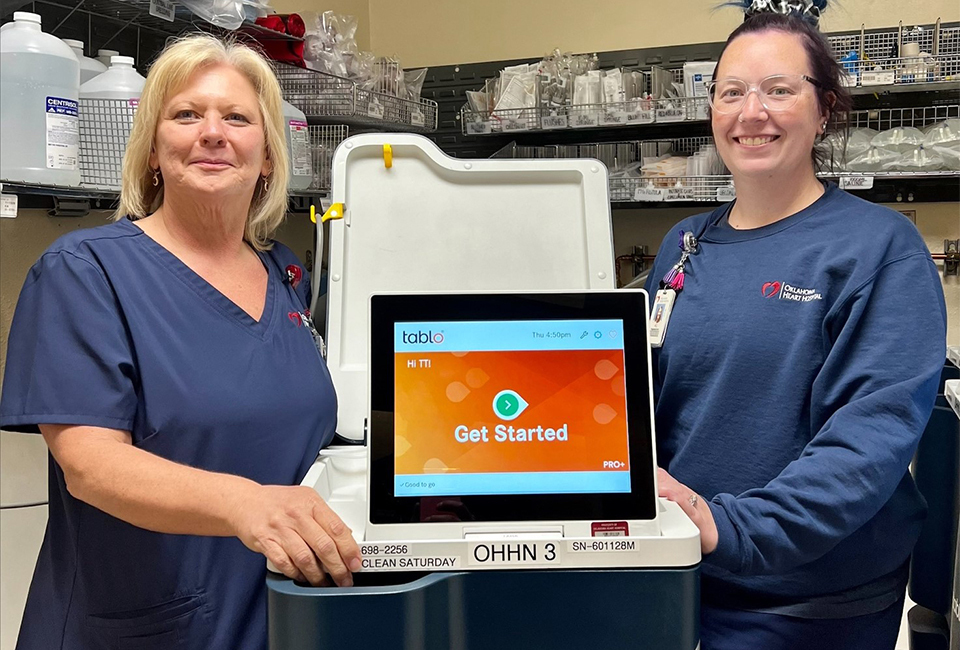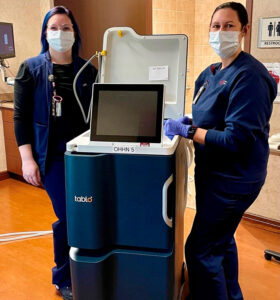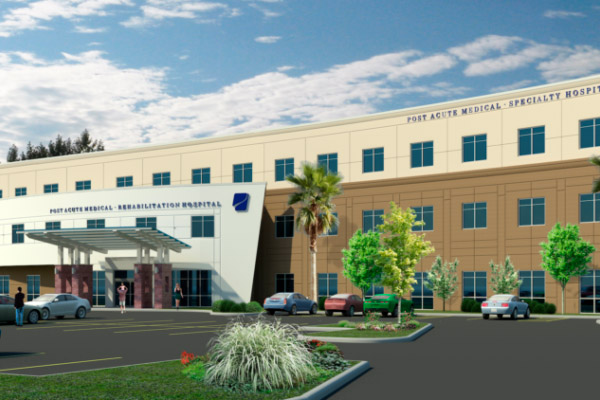Oklahoma Heart Hospital: Teamwork Optimizes In-House Hemodialysis Services

Summary
This highly awarded hospital transitioned its hemodialysis in-house with Tablo, developing critical care nurses with dialysis expertise along the way and supporting its mission of excellence in quality and service.
Oklahoma Heart Hospital (OHH) is its state’s largest and most comprehensive hospital system dedicated to the prevention and treatment of heart disease. The OHH staff also manage cardiac patients with acute and chronic kidney disease, with kidney failure patients often having their first dialysis experience at the hospital, led by a team of award-winning and deeply committed nurses. In late 2021, leadership made the decision to begin transitioning its previously outsourced hemodialysis services in-house, using the Tablo® Hemodialysis System.
The team’s strategy was to first convert its intermittent hemodialysis (IHD) program to Tablo, followed a year later by the critical care unit (CCU), all enabled by impressive teamwork and cross-training between the nursing teams. Josh DuFour, RN, the CCU and Emergency Room (ER) Director at Oklahoma Heart North campus, along with Cheryl Mushaney, RN and KC Barron, RN, each with critical care expertise and two decades of experience at the hospital, led the launch of the new program.
“We take great pride in the care of our patients and their families,” says DuFour. “We have excellent cardiac outcomes and we expect the same thing with our dialysis program. With Tablo, our CCU and IHD teams now have complete control of our dialysis services, quality and timeliness of patient care throughout the hospital.”
Fast Track to Implementation
DuFour first heard of the Tablo technology a few years ago when he and his Chief Nursing Officer visited a hospital in Dallas, TX that was using the machines. “We saw Tablo in action, were impressed by the modern technology operated by their own staff, and talked to some of the staff that were using it,” he says.
Then, while dealing with pandemic patient surges in 2021, Oklahoma Heart Hospital found it was ready for a more streamlined dialysis system. The team decided to take a serious look at Tablo. They began meeting with the Outset Medical team and developed a plan to build and launch their new program from the ground up, all within a few short months.
“We really liked what we were seeing and hearing about how Tablo could impact our patient care and other efficiencies,” explains DuFour. “In late 2021, we decided to move away from the outsourced service to 100% in-house with Tablo, with a really compressed timeline. We didn’t really mess around. We started our program from scratch, and it was definitely a great team effort with Outset. Our team, with Cheryl and KC as our training leaders, were willing to take it on and own the new program. Having Tablo has streamlined everything.”
“Having Tablo has streamlined everything.” – Josh DuFour, RN
Successful Launch Strategy: IHD Followed by CCU
Barron explains that their strategy was to begin in February 2022 by training the staff on cannulating fistulas and grafts, then converting the hospital’s IHD to an in-house service with Tablo. After the nurses gained a year of experience in optimizing patient care and operational efficiencies, the team applied this experience as they transitioned critical care to an all-Tablo model as well.
Oklahoma Heart Hospital North campus started with two Tablo consoles and now has six, all with the optional PRO+ upgrade that enables treatment duration up to 24 hours and a dialysate flow rate down to 50 mL/min.*
“We started with IHD, allowing us time to build a team of super-users both on day and night shift, using our own people that our staff already trusts, who they can go to for help and advice, including Cheryl [Mushaney] and I,” explains Barron. “With Outset’s support, our team was able to become knowledgeable and gain experience on all aspects of the Tablo machine. Then, along with the IHD staff, we were able to share our knowledge with the CCU nurses, who had previously been using different dialysis machines. They, along with Outset, helped get the CCU staff trained and experienced in running treatments, so they felt comfortable and confident when we rolled out Tablo with PRO+ in the critical care unit a year later.”
“The CCU nurses were hesitant at first, and then after doing the four-hour class we created, and coming and spending time with us as we treated IHD patients, they fell in love with [Tablo] just as much as we have,” she continues. “We even named our consoles: Tate, Tabby, Tara, Toby, Tyson and Tina.”
Barron says that she was also hesitant at first about using the new machines, but was impressed with the capabilities and ease of use with Tablo. “I like the animated instructions on the touchscreen, to walk you through each step. I remember shortly after we started IHD in-house, I came to Josh and said we have to bring this in for longer-duration [12- to 24-hour] treatment because I think it would change a lot. Fast forward a year, and we now use Tablo with PRO+ for 12- to 24-hour treatments in our CCU.”
DuFour notes that their nephrologists had concerns initially with what patient clearances and lab work were going to look like. “Their concerns were quickly put to rest after we did a couple treatments,” he says. “They saw the lab work and were happy with everything.”
Mushaney says that patients have also commented on the new system and the ease of having this one little machine do everything.
Smooth CCU Transition

Mushaney explains that in preparation for going live in the CCU on February 1, 2023, she and Barron started training CCU staff on Tablo with the newly added PRO+ upgrade a month prior. “We had four nurses in each Tablo training class and we held four classes, so we had 16 people, including eight for day shift and eight for night, already trained and ready to go when we transitioned over to the new machines,” she says.
“We’ve now got super-users on both shifts, and they know they can call us at any time if they have any questions or need to troubleshoot anything,” adds Mushaney.
She also adds that the quick turnaround time with Tablo setup is critical in the CCU. “You can return blood, change the cartridge and get back on treatment within 30 minutes. The scheduled saline flushes are also a convenient feature, and being able to see treatment reports automatically on the machine itself has been very helpful. And now we’re not having to wait on pharmacy to get dialysate, or change dialysate bags every few hours.”
“The maneuverability, compact size and self-contained design of Tablo definitely makes it easy to use,” says Barron. “We’re not having to drag a machine, an RO and all these other supplies around, and it takes up significantly less room bedside in the CCU.”
Workflow and Teamwork
Since bringing Tablo in-house, staff workflow at Oklahoma Heart Hospital has been streamlined, and teamwork across departments has been optimized with the continuity of dialysis they now have.
“The flow between the cardiology team and the nephrologists allows us to better plan for getting these patients their dialysis, and moving them to the cath lab or the operating room, whatever they need,” says DuFour. “It’s just a huge difference, and gives us the high quality of care that our patients and their families expect.”
Going from outsourced to insourced dialysis has also lowered costs for Oklahoma Heart Hospital.
DuFour also says that the CCU and IHD staff work closely together to manage all patients needing dialysis. “I think we may be fairly unique in doing that, but that’s made all the difference to have our team call upon each other as they’re doing treatments and troubleshooting, and to have cardiac ICU nurses who are experts at dialysis.”
DuFour says that going from outsourced to insourced dialysis has also lowered costs for Oklahoma Heart Hospital. “We were going through tons of supplies, paying for the rental of our previous machines, and paying for each treatment with the outsourced provider. Now we’re not spending that money. Tablo has been a win all the way around.”
About Oklahoma Heart Hospital
Oklahoma Heart Hospital (OHH) celebrated its 20th anniversary in 2022. This physician-owned hospital was designed by cardiologists from the ground up to ensure that patients receive expert, individualized care with the utmost comfort. OHH is the first of its kind in Oklahoma and the first all-digital hospital in the United States.
In August 2023, Oklahoma Heart Hospital was named by Forbes magazine as one of the top five Oklahoma employers in its annual “America’s Best Employers by State” list, for the second consecutive year. For the last nine years, the hospital has received the Press Ganey Guardian of Excellence Award, recognizing top-performing facilities that consistently rank in the 95th percentile of performance in patient satisfaction in the healthcare industry.
Photo at the top of the page: Cheryl Mushaney, RN (left) and KC Barron, RN with a Tablo console at Oklahoma Heart Hospital North campus.
* PRO+ is an optional upgrade to the Tablo Hemodialysis System that enables treatment duration greater than 12 hours and up to 24 hours, and dialysate flow rate down to 50 mL/min. The System allows five additional dialysate flow rates less than 100mL/min: 50mL/min, 60 mL/min, 70mL/min, 80mL/min and 90 mL/min.
The views and opinions expressed herein represent the personal opinions of the facility staff, and do not represent the views or opinions of other persons, institutions or organizations.

